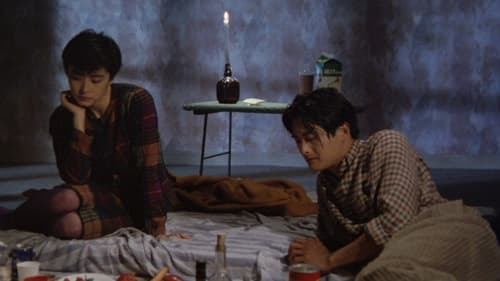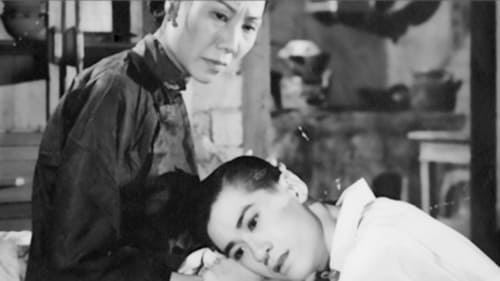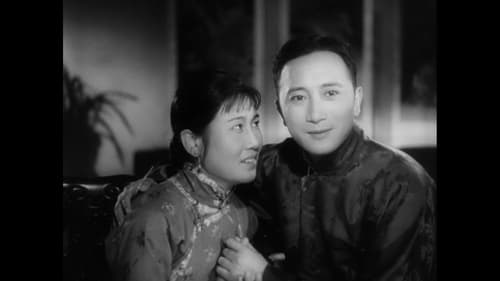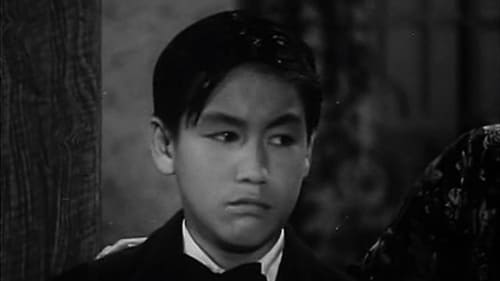
Lei's blind granny
Chow Yun-Fat and Brigitte Lin have their incredible talents used to the hilt in this romantic mystery about a pair of tragic lovers from 2100 years before now reincarnated in modern Hong Kong.

Jennie's mother
Working as a telephone operator on the nightshift, David Lau received some calls from a woman for a David and agrees to a blind date. Wearing a violet on his lapel, David mistakes someone else for his date. Jennie Lee, a stranger, comes calling at the hotel, addressing a bewildered David with an intimacy that is familiar and awkward. Mok Yu-fuk, the self-proclaimed Sherlock Holmes, follows Jennie but gets robbed. Lau received an invitation to Jennie's birthday party. The guests acting strange at the party. Jennie and Lau take a stroll along the beach. Jennie suddenly hurls herself into the sea in a run. Five years ago, when Jennie was having a heart-to-heart talk with her fiance David Wong on the beach, her neglected brother ran off to the sea and drowned himself. Suffering from a nervous breakdown ever since, Jennie was devasted by the departure of her fiance to America. The hopes Jennie's parents are pinning on the new David to boost their daughter's recovery are merely wishes.

Matriarch To
Orphan Lee Dan-hung is made a scapegoat by her cousin Chor Kwai-ping. Facing drug trafficking charges, Lee is released on parole with the doctor To King-chung as guarantor. Lee works as a sanatorium nurse. The modest caretaker, Matriarch To plays matchmaker for her son To Ngan-sing and Lee. Ashamed of her past, Lee listens to the doctor's advice and keeps the Tos in the dark. Chor returns and coerces Lee into colluding with smuggling ring by threatening to kill her newborn daughter. The reluctant Lee is arrested in a police raid together with the gang members but is later acquitted. With a reputation to defend, To toughens his heart and expels Lee. Lee leaves for Borneo with a touring opera troupe but a yearning for her daughter brings her back several years later. Feeling for the upset in-law, Matriarch To grants her stay until his son's return from business in a few months' time. When To returns, he decides to make up for the wasted time by bringing Lee and her daughter home.

Fan's mother
Lawyer Fan Kam-man believes that his wife Chun Yuen-yung perished in a plane crash three years ago and walks down the aisle again with Yan Bik-kei. In fact, Chun survived a crash-landing on a deserted island with fellow passenger Wong Ah-lik, a biologist. Returning to civilisation, Chun sabotages their wedding night at the hotel. Overjoyed with her safe return, Fan pulls off a feat with his mother and wife to terrify Yan into divorcing him. However the lie is exposed when Wong shows up. Unyielding, the women settle to serve as wives to the same man. Mistaking Fan for the person Chun is going to see, the eavesdropping Yan goes to the date in her stead and unwittingly sleeps with Wong. Yan finally settles for Wong, putting an end to the topsy-turvy.

Cantonese adaptation of Daphne du Maurier's novel Rebecca.

Madam Chiu
Married and with a son on the way, Zhang takes shelter in a big old house haunted by a ghostly female vampire.

To Chi's aunt
A Hong Kong historical drama

Mrs. Lok
The Lok's family disperses when Japanese occupied China. Mrs. Lok's company prospers in Hong Kong. Her son Tin-yam looks after her business. She misses her daughter. Another daughter Chui-yin dates Kuk-tat. Mrs. Lok hopes that Tin-yam will find a good partner. Wan Yuk-yin works in Mrs. Lok's company and meets Tin-yam. They fall in love. Mrs. Lok asks Yuk-yin to leave Tin-yam. Facing his mother's objection, Tin-yam falls ill. Mrs. Lok let them marry. The wedding guests despised the bride, which makes Mrs. Lok uncomfortable. The couple lives happily, but Mrs. Lok and Chui-yin make Yuk-yin embarrassed. Kuk-tat covets the Loks' fortune. He steals their jewels. Mrs. Lok thinks Yuk-yin did it. Yuk-yin is innocent, but she is expelled. Tin-yam returns. Yuk-yin's parents seek justice at the Loks. Mrs. Lok's saw the Yuk-yin's birthmark. She realizes Yuk-yin is her lost daughter. Mrs. Lok decides to be a dutiful mother. Tin-yam is an adopted son of the Loks so the couple lives happily.

Lee Sun-fung is renowned for adapting literary classics for the silver screen. To commemorate the seventh anniversary of the Union Film Enterprise known for producing quality films and co-founded by Lee, Human Relationships is adapted from writer Ba Jin's novel into film. The Yiu family moves into a manor. Mrs Yiu, while frustrated by the way her step-son is spoiled by her husband and mother-in-law, develops a friendship with a kid (Michael Lai) who steals flowers from the mansion's garden. She later learns that he is the son of the place's former owner whose downfall at middle age is the result of being spoiled when young. Lai was only a child but gained a foothold among seasoned veterans like Cheung Wood-yau, Ng Cho-fan and Pak Yin.

Ka-Bo's mother
After inheriting his father's estate, Cheung Ka-bo leads a life of debauchery after getting know Blackie Yuen, who profits at others' expense, and Yee-Wah, who working at a night club. As the family wealth diminishes, he always squabbles with his wife and finally separates from her. She returns a diamond bracelet, kept by Uncle Chan, to her mother-in-law. Bo's mother hides the bracelet in a chair. Later, Wah resides at Bo's home. To flatter Wah, Bo wants to get the bracelet by any means from his mother and give it to Wah. Later, Bo's mother falls ill. In the hospital, she tells Bo of the bracelet's whereabouts but the chair has already been sold to Uncle Chan by Wah. Bo, Wah and Yuen stealthily enter Chan's home to get the chair, but have a big fight when they try to take the bracelet. Knowing that Bo has huge debts, Wah intends to leave him after getting the bracelet. Wah exposes her gluttonous self in her pursuit of the treasure. Bo learns his lesson and returns to his wife.

Mrs. Chiu
A delicious comedy from Union Film, Money, traces the journey of a bag of cash from a bank robbery. The humour switches between the witty and the absurd, offering a biting examination of human nature when men and women are confronted with the chance of unearned wealth.

Tso Kea was adroit in adapting film and literary classics from the West, organically transplanting stories and characters onto Chinese soil and nurturing them to glorious fruition. Love Lingers On is based on the gothic novel Wuthering Heights and Tso shepherds Emily Brontë's tale of profound passion, thwarted love and bitter vengefulness with a perfect balance of broad narrative strokes and delicate orchestration of mise-enscene. He wisely concentrates on the lead characters' simmering mental troubles, greatly enhanced by stars Cheung Ying and Mui Yee, who overcome glaring age differences with their characters to bring life to this saga of vivid emotions.

Ghost story from Hong Kong directed by Ng Wui.

Mrs. Kong
Kam Fan and Wong Ching-ping have a peaceful married life, until Ping's mother is serious ill. They desperately need a large amount of money. Fan tries in vain to raise money, he thus intends to use their daughter's school fees for the medical fees. Ping is against it and works as a song girl to earn money for her mother's medical expense. Her grudging husband Kam Fan uses a bed sheet to partition the bedroom into halves and even demands a divorce.
After some mediation by their lawyer and neighbours, Wong finds a teaching job at an orphanage, but Fan still opposes it. Ping is so angry that she moves to live in the dormitory of the orphanage. Fan has to look after their daughter alone, making everything a mess. Later, their daughter catches a cold and has a high fever after an outing with Fan. Ping cannot set her mind at rest and goes home to take care of her daughter. The loving couple reconciles, for the sake of their daughter.

To Lai-kuen
Though her marriage with rich businessman Chan Hak-lit is crumbling, Anna Poon refuses to accept her childhood sweetheart Wong Kei-shu's courtship. Anna's younger sister Mei-na has a crush on Shu and treats Lee Man coldly. When she sees Anna being with Shu, she taunts Anna with stealing who she likes. Anna is hurt and goes back to Chan's house. Chan holds a house party and invites business celebrities. Shu attends it and when tells Anna he loves her when they dance. Anna rejects him and tells him never to see her again. Chan goes to the racecourse. When Shu falls down from a horse, Anna faints. Chan asks Anna what her relationship with Shu is. He warns her not to have any wrongdoing and ruin his reputation. Shu is fine and asks Anna to meet for the last time. Anna cannot turn down him and goes to meets him. Lit miscomprehends the situation and files a divorce. He even forbids Anna to see their daughter. A distressed Anna becomes a victim of love in a conservative society.

Yam Suk-kuen
Chan Sai-wah abides by his late father's word and marries the wealthy Yam Suk-kuen. They have a son, Kwok-leung. Though Wah is manager of the hotel owned by his father-in-law, Kuen is not a good wife. For all the years of their marriage, Wah has never been happy. Attracted to the humble and honest Carrie Mui, Wah decides to leave his domineering wife Kuen, but is stopped by his father-in-law. The lovers set off to Macau for a new start.
Their life has become increasingly miserable under the pressure from Yam's family. When Wah leaves to seek help from his son in Hong Kong, Carrie decides she should leave so that Wah can go without feeling any guilt or burden. On the other hand, Wah is too ashamed to face his son, and returns to Macau. He lives his life in misery. Years pass, the lovers meet again. Wah is reduced to begging in the streets while Carrie becomes an opera diva.

Widow
Reporter Yu Mong-yuen is recovering from a leg injury in his fiancee Man-wah's apartment. Bored, he looks out the rear window and observes the life of the neighbouring building. Among the tenants are a sugar-daddy and his mistress, a middle-aged man wants to marry a young girl, but she is in love with his son. Finally, she hatches a plot and makes the man agree to her marrying his son ; a sly fortune-teller ; a lively gym, a rich widow quarrels with the trainer of a gymnasium because his dog has bitten her cat ; and an opera school, a woman signs, leaning on the balcony, and a man tries to strangle her. In fact they are rehearsing an opera…… One evening, Wah is on the night shift, and Yuen watches the opera troupe rehearse to the end. Under the influence of drugs, Yu mistakenly believes that a divorced man has murdered a taxi dancer. He alerts the police, but the whole thing is nothing more than a misunderstanding.

Lei's wife
An opera troupe has to dissolve in view of the poor economy. Comedian star Sang Kwai-lei loses his job and he has no alternative but to play the lion character in the opera troupe of his former junior apprentice Chan Hau and pawn his stage costume. He aims at earning enough money to support the final year's secondary school studies of his elder son Chi-kuen. Kuen however refuses to continue his studies, seeing that his father has to put aside his dignity to earn money and his mother is worried. Lei is enraged and uses the money to support his younger son Chi-wai's studies.
Again, Lei loses his job and he resorts to giving street performances, his wife takes up sowing work in her spare time and she dies after a long illness. Kuen works to support himself through school, but Wai is less fortunate, he is forced to enrol in an opera troupe as an apprentice. Years later, the dying father joyfully embraces Chi-kuen's return from his studies.

Man Suen's mother
Cold Nights features great performances by both Pak Yin as a tough minded “new woman”, Shusheng, and Ng Cho-fan as her weak husband, Wang Wenxuan, whose spirits have been crushed by the Sino-Japanese war.

The film features a conflict between a young wife and her mother-in-law, depicting the lives of ordinary people and their profound problems.

Mrs Sek
After seeing a friend of his boss' son adopted over his promised promotion with connections, Shrimp's father, a minor white-collar worker Ng Kwun-sing, vows to get Shrimp a place in a prestigious school and a chance to make friends with the rich. However, Shrimpy is constantly bullied and discriminated against by his classmates. Ng has not the means to be a social climber and finally realises his mistake. He sends his son to a voluntary school so that he may grow up happily. This poignant father-son drama shows a parents' willingness to carve out a good future for their children by any means necessary.

This early leftist social drama from Hong Kong offers a panoramic portrait of a crumbling apartment complex and its down-and-out denizens, including a taxi driver, an unemployed teacher, a professional reduced to selling his blood and, of course, a venal landlord. In addition to establishing an omnipresent theme in Hong Kong cinema – the plight of the urban poor – the film is also a prime example of the popular melodramas of the time, which featured displaced Mainland film stars.

Lee Shui-kok
"Family" (1953), which launched the Union Film legacy, "Spring" (1953) and "Autumn" (1954) are adaptations of Ba Jin's highly regarded novel "Torrent Trilogy". In "Family", director Ng Wui skilfully condenses the voluminous first part of the novel into an emotionally powerful and intellectually focused story of youngsters struggling to survive oppression and repression in a feudalistic family. This well-received film quickly established the company's reputation.

Nanny
13-year old Bruce Lee plays San, a child up for adoption. Finally accepted by his surrogate parents, he is faced with a dilemma when his real parents show up and want him back.

Mrs. Kwong
A prodigal son is married to a woman his mother dislikes. The wife is then expelled from the family circle and forced to become independent.

Drama from Hong Kong directed by Chun Kim.

Wong Suk-Han
Comedy from Hong Kong directed by Yeung Kung-Leung.

A concubine and a cousin attempt to poison a rich man's son to gain the inheritance. But he survives and must fight back.

Hong Kong romance.

Wai Kim-Fong stars in this ode to Chinese womanhood as a woman whose bravery and patriotism are equal to those of her male comrades.

Chiu Ching-Ha
Historical drama from Hong Kong directed by Leung Siu-Bo.























